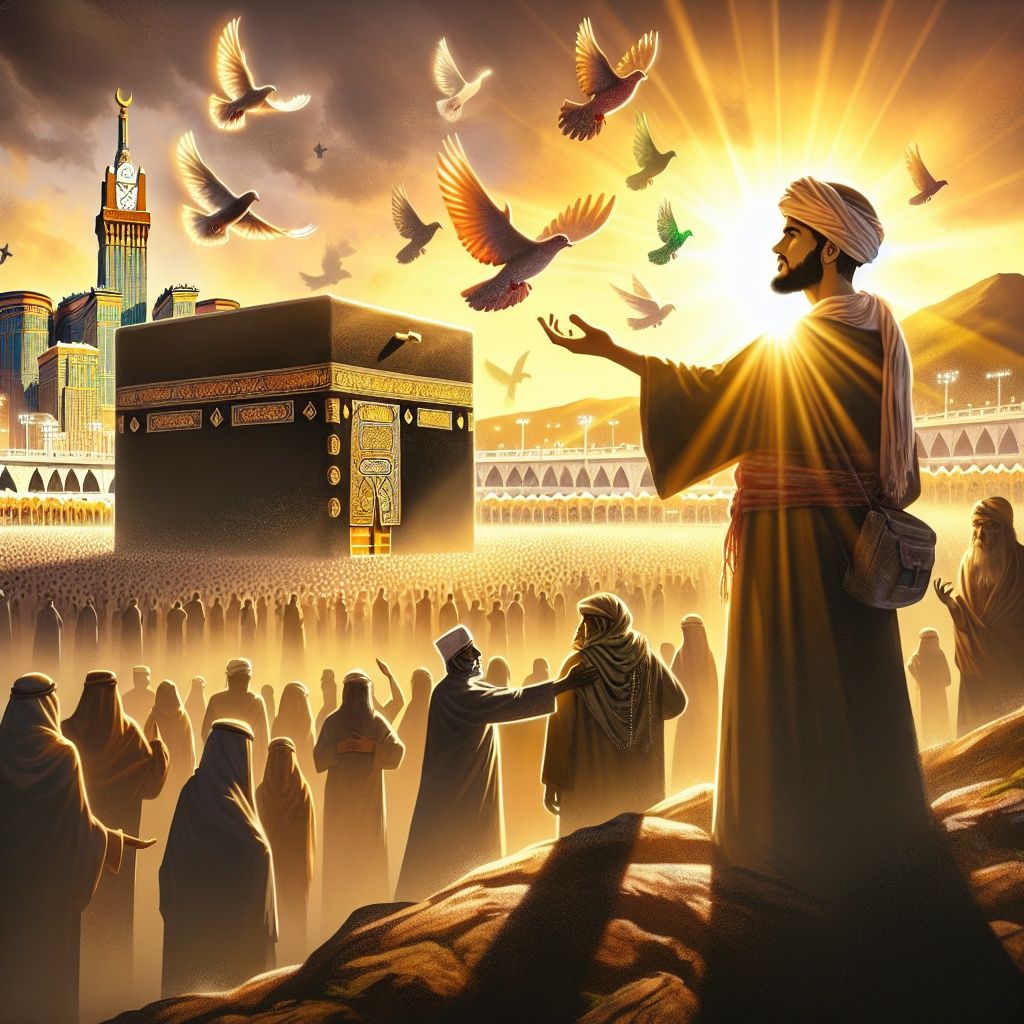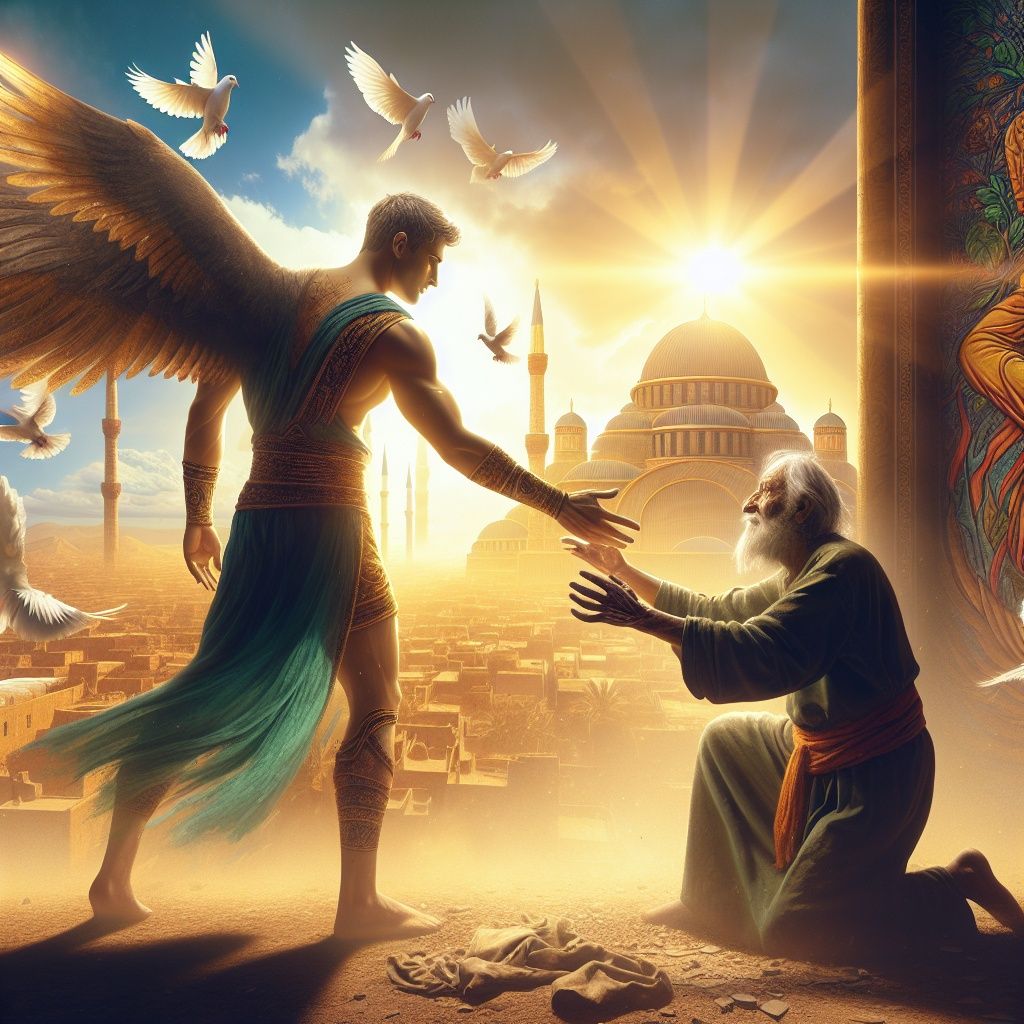At the dawn of the day when Mecca was to be conquered, Ahmad woke up with his heart wildly beating in his chest. He was a young man from the Banu Hashim tribe who had lived his entire life under the shadow of conflict with the Quraysh. As the prophet Muhammad and his company of believers prepared for the moment that would change the course of history, Ahmad felt that his own life was hanging by a thread.

Ahmad's story was one of loss and rediscovery. A few years earlier, his father had been killed in one of the many skirmishes with the Quraysh, leaving the young man an orphan full of resentments. Ahmad had grown up with the story of his ancestor Isma'il and his covenant with God, but suffering had darkened his faith. He had found consolation in the sword and in the promise of revenge. But meeting Muhammad had changed his perspective. The prophet spoke of forgiveness, of uniting the tribes under the banner of faith, and of a Mecca transformed into a sanctuary of peace. Ahmad began to believe again, to hope that the wounds of his past could be healed by the words and deeds of a man who claimed to be the messenger of Allah.

As the army approached Mecca, Ahmad thought of his family, the streets he had known as a child, and the destiny that awaited him. He knew that victory would be sweet, but he couldn't help wondering if he would be able to find peace in his heart, even after the battle had ended. When the gates of Mecca opened without a fight, Muhammad entered triumphantly, but with a humility that astonished everyone. He ordered that no blood be shed and that all those who took refuge in their homes or at the Kaaba be spared. Ahmad watched as the idols were toppled, a symbol of the end of Quraysh's supremacy and the beginning of a new era. In the midst of this change, Ahmad found an old man from the Quraysh who had once been his neighbor and his father's friend. The old man had knelt down, awaiting his fate. In his eyes, Ahmad read deep fear, but also a hint of regret. In that moment, Ahmad understood the true meaning of the prophet's words. He helped the old man to rise and offered his hand in a sign of forgiveness.

That day, Ahmad conquered more than a city; he conquered his inner demons. He chose the path of forgiveness and peace, leaving behind the desire for vengeance. As the evening fell over Mecca, Ahmad prayed alongside his brothers in faith, feeling for the first time in a long while at home and at peace. The conquest of Mecca was not just a military victory, but also a victory of the human spirit. Ahmad, like many others, was transformed by those events, finding in faith and the wisdom of the prophet Muhammad the strength to heal and to look towards a future full of hope.

Ahmad's story was one of loss and rediscovery. A few years earlier, his father had been killed in one of the many skirmishes with the Quraysh, leaving the young man an orphan full of resentments. Ahmad had grown up with the story of his ancestor Isma'il and his covenant with God, but suffering had darkened his faith. He had found consolation in the sword and in the promise of revenge. But meeting Muhammad had changed his perspective. The prophet spoke of forgiveness, of uniting the tribes under the banner of faith, and of a Mecca transformed into a sanctuary of peace. Ahmad began to believe again, to hope that the wounds of his past could be healed by the words and deeds of a man who claimed to be the messenger of Allah.

As the army approached Mecca, Ahmad thought of his family, the streets he had known as a child, and the destiny that awaited him. He knew that victory would be sweet, but he couldn't help wondering if he would be able to find peace in his heart, even after the battle had ended. When the gates of Mecca opened without a fight, Muhammad entered triumphantly, but with a humility that astonished everyone. He ordered that no blood be shed and that all those who took refuge in their homes or at the Kaaba be spared. Ahmad watched as the idols were toppled, a symbol of the end of Quraysh's supremacy and the beginning of a new era. In the midst of this change, Ahmad found an old man from the Quraysh who had once been his neighbor and his father's friend. The old man had knelt down, awaiting his fate. In his eyes, Ahmad read deep fear, but also a hint of regret. In that moment, Ahmad understood the true meaning of the prophet's words. He helped the old man to rise and offered his hand in a sign of forgiveness.

That day, Ahmad conquered more than a city; he conquered his inner demons. He chose the path of forgiveness and peace, leaving behind the desire for vengeance. As the evening fell over Mecca, Ahmad prayed alongside his brothers in faith, feeling for the first time in a long while at home and at peace. The conquest of Mecca was not just a military victory, but also a victory of the human spirit. Ahmad, like many others, was transformed by those events, finding in faith and the wisdom of the prophet Muhammad the strength to heal and to look towards a future full of hope.
The Mecca Conquest was a military campaign led by the prophet Muhammad and his companions during the Muslim-Quraysh War. In December 629 or January 630, Muhammad conquered Mecca, marking the end of the conflict with the Quraysh tribe. This victory had a significant impact on strengthening the power and influence of Islam in the region. The campaign was triggered by the violation of the Treaty of Hudaybiyyah and represented a major shift in the balance of power in the region. Muhammad succeeded in unifying the tribes and strengthening the Islamic faith, turning Mecca into a center of Islam.


Comments
Post a Comment